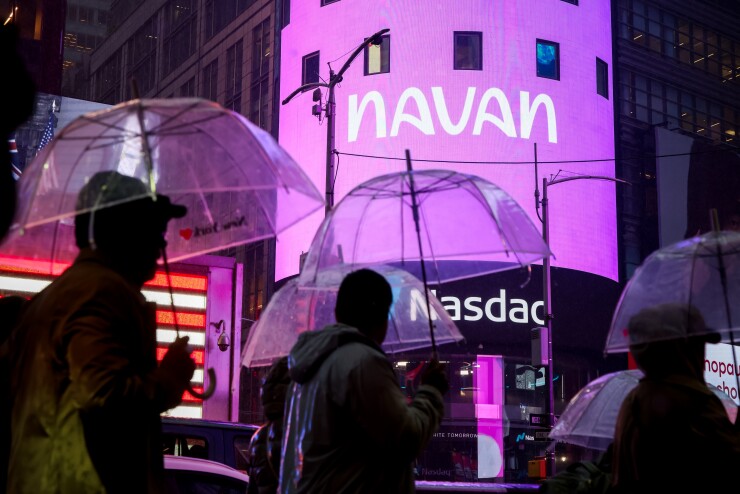Navan Inc. shares slumped 20% after the business travel and expense management software maker and some of its shareholders
Shares of the Palo Alto, California-based company closed at $20 each, below an IPO price of $25 apiece. The company and the selling shareholders marketed stock for $24 to $26 each.
The trading gives Navan a market value of nearly $5 billion, based on the outstanding shares in its
That compares with a valuation of about $9.2 billion as of October 2022, according to data provider PitchBook. The offering was 10 times oversubscribed, people familiar with the matter have said.
Navan went ahead with the IPO despite the U.S. government shutdown, complicating its path to going public. The Securities and Exchange Commission issued guidance making it easier for companies to list while much of the regulator's functions are on hold.
The company sold 30 million shares, and shareholders including Navan's co-founders, Chief Executive Officer Ariel Cohen and Chief Technology Officer Ilan Twig, sold 6.9 million shares for $25 each.
Founded in 2015, the company's app leverages AI to enable travelers to manage their hotels, transportation and expenses. It had about 3,400 employees as of July 31, and over 10,000 active customers as of Jan. 31, the filings show. Navan counts Zoom Communications Inc., Canva and Paysafe Ltd. among its customers, its
"The best AI companies on the planet are actually using us, the Navan platform, to support their employees when they think about travel," Chief Executive Officer Ariel Cohen said in an interview with Bloomberg News, citing OpenAI and Anthropic among Navan's users.
"I love the AI story that's part of Navan, because we're demonstrating our own use in our numbers," according to Chief Financial Officer Amy Butte. The firm's gross margin improved from 60% in fiscal 2024 to 68% in fiscal 2025, according to its S-1 filing.
"Our margin expansion, which you see in the S-1, is the direct result of our leveraging our AI bot Ava in customer support," Butte said in an interview.
The company's adoption of AI is a key selling point in the investor pitch for its IPO, yet its extensive use of virtual travel agents hasn't translated into sustained profitability so far.
Navan had a net loss of $99.9 million on revenue of $329.4 million for the six months ending July 31, compared with a net loss of $92.5 million on revenue of $253.7 million in the corresponding period a year earlier, according to the filings.
Cohen and Twig control 34.5% and 49% of the voting power respectively after the IPO via Class B shares, the filings show. Lightspeed Venture Partners has 21% of the Class A shares, Zeev Ventures has 16%, Andreessen Horowitz has 11% and Greenoaks has 6.1%.






